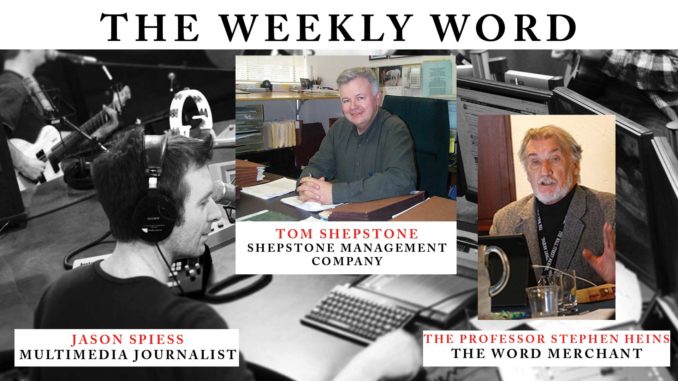

This Weekly Word with Jason Spiess and the professor Stephen Heins hosts Tom Shepstone from Pennsylvania, who is an urban consultant, community planner, researcher and advisor for zoning and land use in the Northeast of the U.S.
Shepstone began the conversation by providing a history of the Appalachian Basin over the last 10years. Shepstone described the Fracking Revolution as a “miracle” through the use of horizontal drilling and hydraulic fracturing.
Spiess mentioned that he had published a piece about the disparity between the Bakken Basin and Marcellus Basin, where he talked about the “wet” gas (mainly oil with 7-9 kinds of other gas) of the Bakken and the “dry” gas (predominantly consisting of natural gas with fewer other kinds of gas) of the Marcellus.
Spiess asked why New York City was using so much natural gas from the Marcellus and Shepstone replied that dry gas is mainly natural gas and not oil, so that the low cost of sending the natural gas 100 miles without the need to be processed is compelling. Then, Heins asked Shepstone why the New Your Governor and the current Mayor of NYC are so adamantly anti-fossil fuel and anti-pipeline. Shepstone pointed out that the previous Mayor, Michael Bloomberg, was the one chiefly responsible for the large emission reductions achieved by transitioning the City from the use of dirty Number 6 oil to the Marcellus natural gas. Rhetorically, Heins wondered why neither the NY Governor and NYC Mayor ever mention that fact. Shepstone observed that the NY urban area has 3 or4 times the population of upstate NY. He went on to say that urban populations rarely know much about oil or natural gas and their production.
Spiess spoke about the phenomenon of the “professional protester” at the recent pipeline protests. Both, Heins and Shepstone have noticed that there were many of the same faces at different protests, with Tom saying “have cause will travel.” Spiess responded that climate change has become far too sensationalized with far too much fear-mongering. Shepstone thought that many of the protesters may simply be attention seeking. Spiess called it the “religion of environmentalism.”
On another note, Heins mentioned the great job that Spiess has been doing by telling the story of Bakken through average North Dakotans who work and benefit from the Shale Revolution. Instead of “mushy” news release by the private sector, Shepstone believes that the only way to change the fossil fuel demagoguery to a more thoughtful discussion will be through beating them in court.
While talking about the science of fracking, Heins concluded that the large NGO’s seem to be the only groups who are being anti-science, especially when it serves their purposes. Finally, Shepstone thought that this “Weekly Word” segment got to root of these complex issues better than any in which he had been a participant.

